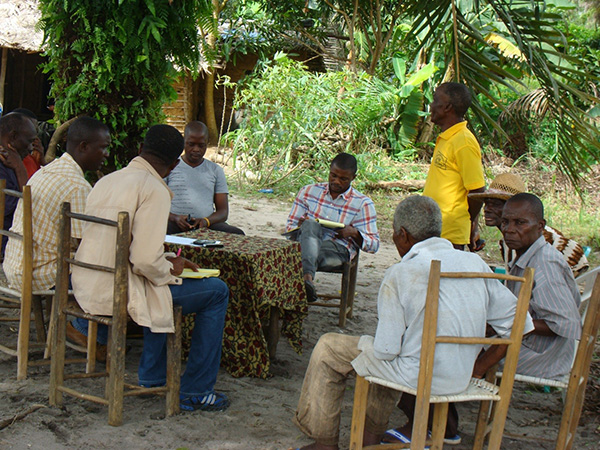Interpeace co-hosts a panel on resilience and peace at the second World Bank Forum on Fragility, Conflict and Violence

Over 200 partners, and more than 600 participants, gathered in Washington DC between March 1st and March 3rd to discuss issues of fragility, conflict and violence at the World Bank's second annual fragility forum.
This year, Interpeace co-sponsored a panel with the Institute for Economics and Peace (IEP) on the topic of resilience and how it relates to peacebuilding. In the context of peacebuilding, resilience signifies the capacities that enable individuals, communities and institutions to anticipate, prevent or transform conflict towards peaceful ends. Recognizing the importance of this issue, the Alliance for Peacebuilding and the French Foreign Ministry lent political support to the session.
Opening the session, the IEP presented its work on positive peace, the idea that peace is not merely the absence of conflict but also encompasses positive values such as equality, respect for human rights and economic development. With a dataset from 162 countries, and stretching back over the past ten years, their research aims to define the attitudes, structures and institutions that are crucial for peacefulness in society.
Their research has identified eight factors; based on statistical data collected for 162 countries over the last 10 years: well functioning governments, a sound business environment, equitable distribution of resources, acceptance of the rights of others, good relations with neighbours, the free flow of information, high levels of human capital and low levels of corruption.
These eight factors are considered the basis of resilience and all contribute to peace. In contrast to this macro level research, Interpeace presented its Frameworks for Assessing Resilience programme (FAR) which has been ongoing for the past two years and has taken a country specific, and participatory approach, to identifying resilience capacities in societies. Experience from Guatemala, which is one of three case studies - the two others being Liberia and Timor-Leste - was presented.
Over a two year period, a broad and diverse range of Guatemalans were consulted to define and better understand the resilience that exists within their society. The emerging conclusions from these consultations were then used as the basis for a multi-stakeholder dialogue process that led to proposals to address some of the most pressing drivers of conflict in Guatemala, including socio-environmental conflicts and the fragility of state institutions.
Whereas, resilience has been applied in the humanitarian and disaster risk reduction fields to describe the ability of a community or society to ‘bounce back’ and recover from external shocks and crises, a key finding from the FAR programme is that a broader definition is required when applying the concept to peacebuilding processes.
"When it comes to building peace, people living in fragile settings are not satisfied with a definition of resilience that is limited to absorbing or adapting,” Otto Argueta, Learning and Policy Officer at Interpeace’s Regional Office for Latin America said during the panel. For these people, in a peacebuilding context, resilience must mean more than merely “bouncing back” from shocks.
"Conflict is a fundamentally different type of shock than natural disasters or climate change,” Graeme Simpson, Director of Interpeace US, said empathizing the point. “First it is internal to society rather than external, and secondly, it is incremental rather than momentous; and this requires that we broaden our understanding of resilience"
The following panel discussion and questions from the audience were focused on how these two approaches, IEP’s macro level focus on generic factors and Intepeaces in-depth country level approach, can inform and complement one another. The most important common denominator is that a focus on resilience, rather than fragility, has proven more effective at engaging stakeholders and directing interventions towards what works. However, a lot of work still needs to be done in order to broaden the understanding of resilience to the field of peacebuilding.
Sam Doe, a policy advisor for the UNDP, noted that there is immense potential to bring the resilience approach in to the mainstream of peacebuilding policy. He suggested that we can hope for more effective peacebuilding interventions on the ground if the statistical modeling of resilience for peace is successfully linked with the narratives of peace and resilience.
By continuing to look at resilience through a peacebuilding perspective, and by instigating creative partnerships with others working on resilience, an important contribution to the debate on fragility, conflict and violence can be made at the international policy level.
This was one of several events dedicated to resilience at the World Bank Forum, signaling the increasing momentum of the concept in relation to conflict and peacebuilding. Amongst the events on resilience, there was a high level dialogue on how resilience can connect the dots between emergency relief and development, a point that has been made throughout the FAR programme, in relation to Liberia specifically.
Interpeace’s work on resilience is conducted in partnership with the Harvard Humanitarian Initiative (HHI) funded by the Swedish International Development Cooparation Agency (Sida).
The event was moderated by Graeme Simpson, Director of Interpeace US. Panelists included Michelle Breslauer, Director of IEP’s America’s Program; Dr Otto Argueta, Learning and Policy Officer at Interpeace’s Regional Office for Latin America; Patrick Vinck, Director of Harvard Humanitarian Initiative’s Peace and Human Rights Data Program; Steve Latham, Graduate Instructor on International Community Development at Northwestern University; and Sam Doe, Policy Advisor, Strategic Policy and Global Positioning, Bureau for Policy and Program Support at UNDP. The latter three were discussants on the panel.























